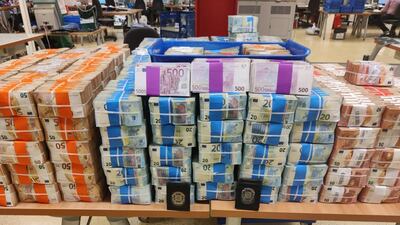More than 40 people were arrested in an international sting to bring down a £90 million ($120m) cocaine gang.
Two people were arrested in Dubai as part of the operation, which involved more than 180 raids around the world.
More than 1,000 police officers took part in the raids, in which 45 people were arrested. There were also 70 high-performance cars and 37 planes seized.

The investigation discovered the trafficking network was responsible for the annual import of at least 45 tonnes of cocaine into European seaports, with profits exceeding £90m over the course of six months.
Crime agency Europol said the international sting was carried out simultaneously by agencies from three continents, led by the Portuguese, Belgian and Brazilian authorities, Dubai Police Force and Dubai State Security.

In Brazil, 38 people were arrested, as well as four in Belgium, one in Spain and two in Dubai.
Officers seized more than €12m ($14.4m) in cash in Portugal, €300 000 in Belgium and $359,000 in Brazil.
Luxury vehicles were seized in Brazil, Belgium and Spain, with 37 aircraft confiscated in Brazil.
More than 160 properties in Brazil worth about $24.5m, two in Spain worth €4m and two apartments in Portugal worth €2.5m were seized. The financial assets of 10 individuals in Spain were also frozen.

"This operation highlights the complex structure and vast reach of Brazilian organised crime groups in Europe," said Europol’s deputy director Wil van Gemert.
"The scale of the challenge faced today by police worldwide calls for a co-ordinated approach to tackle the drug trade across continents.
"The commitment of our partner countries to work via Europol underpinned the success of this operation and serves as a continued global call to action."
The network came to light after Europol received "reliable intelligence" concerning the drug trafficking and money laundering activities of a Brazilian organised crime network operating in several EU countries.
The criminal syndicate had direct contact with drug cartels in Brazil and other South American countries, which were responsible for the preparation and shipments of cocaine in maritime containers bound for major European seaports.
"The scale of cocaine importation from Brazil to Europe under their control and command is massive and over 52 tonnes of cocaine were seized by law enforcement over the course of the investigation," Europol said.
"In April 2020, Europol brought together the involved countries who have since been working closely together to establish a joint strategy to bring down the whole network. The main targets were identified on either side of the Atlantic Ocean.
“Since then, Europol has provided continuous intelligence development and analysis to support the field investigators."
A key breakthrough came when the authorities cracked an encrypted phone network widely used by criminal networks, called EncroChat.
The breakthrough allowed officers to intercept, share and analyse messages exchanged by criminals to plan serious crimes.


